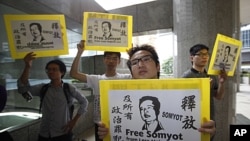A Bangkok criminal court Wednesday handed down the 20 year sentence for 61-year-old Ampol Tangnoppakul on four counts of insulting the Thai royal family.
He was convicted of sending text messages to the phone of former Prime Minister Abhisit Vejjajiva and a member of Abhisit’s staff last year.
Poonsuk Poonsukcharoen, from the Human Rights Lawyers Association, says the case is considered the first time the country’s Computer Crimes Act and Lese Majeset laws have been applied to mobile phone texting called SMS.
“SMS [Short Message Service] - it’s the first in Thailand involved. I have never heard of anyone who was prosecuted using SMS under the Computer (Crime) Act. But in this case the prosecutor prosecute under the Computer Crime Act too, it’s the same action with Article 112 so the punishment is higher, higher than (just) the Computer Act.” Poonsukcharoen said.
Under Thai law those convicted of insulting the king, queen and heir or regent face up to 15 years jail terms on each count. Amendments in 2007 to the laws governing Thailand’s computer crimes act enabled prosecutors to dramatically increase penalties.
Poonsuk said Ampol, who denied the charges, was convicted based on police evidence provided by the local mobile telephone companies.
She said Ampol is a grandfather suffering from cancer which he is being treated for in jail. She said rather than appealing the verdict his lawyers will seek a Royal pardon on grounds of Ampon’s ill health.
Last month a Thai born American man, Joe Gordon or Lerpong Wishaikhammat, 55, pleaded guilty on similar charges linked to the uploading of material to the internet that provided links to a book on the royal family which was banned in Thailand.
Gordon has appealed to the U.S. government for assistance. U.S. embassy officials say they have raised Gordon’s case with Thai authorities at “every opportunity” and support his rights of freedom of expression.
Several nations, including Canada, France, Germany, the United Kingdom, and Australia support reforming the Thai laws. Human rights lawyers say over 400 cases were prosecuted in 2010 alone.
Thitinan Pongsudhirak, a political scientist at Chulalongkorn University, says an increasing number of cases are being prosecuted.
“We have more and more cases of Les Majeste and Computer Crimes Act. It’s a kind of ‘witch hunt’ and then some cases are legitimate but in all cases the punishment is not seen to fit the crime. That’s the number one problem with the law. What is taking place is stiff resistance by Thai officialdom, reinforced by Conservative royalists. Anyone can charge anyone. It ferments and reinforces an environment of mutual distrust, fear and paranoia,” Pongsudhirak stated.
While pro-monarchists have acknowledged weaknesses in the law, they say it remains necessary to have laws in place to protect the royal family institution.
Thai Court Sentences Man to 20 Years for Insulting Royal Family




